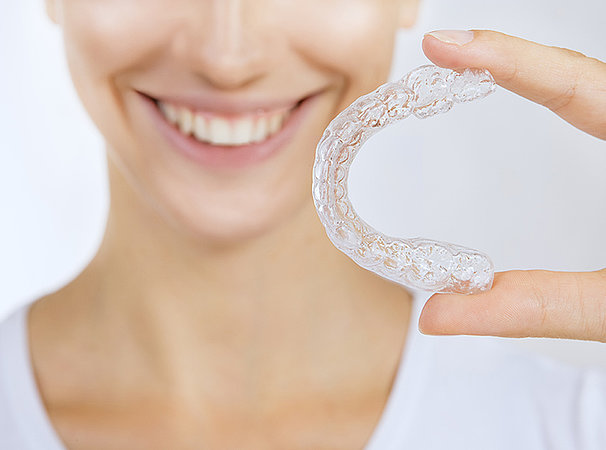Teeth grinding (bruxism) treatment
Teeth grinding and clenching is also known as bruxism. Many people sometimes grind their teeth and clench them hard at the same time. If this only happens occasionally, it is not a problem. However, if the grinding occurs regularly, it leads to damage to the teeth. Headaches and tension can also be caused by teeth grinding.
Why do I grind my teeth?
The reasons for teeth grinding and clenching can be stress and anxiety, but sleep disorders (such as sleep apnea) can also be the cause. Incorrect occlusion (contact between the upper and lower teeth) may also be the problem, for example due to missing or crooked teeth.

Indicators of grinding can be a sore jaw or persistent headaches and tension. People are often made aware by their partner that they grind their teeth during the night.
The teeth and jaw develop during childhood. Thy are shaped by changes in the teeth, the chewing muscles, the tongue and individual habits. In most people, the jaw is not perfect, but can function without problems. For others, the jaw can become unstable. In order to adapt to this, people begin to grind their teeth.
An unstable set of teeth can also be the result of changes due to fillings or crowns. The dentist must always ensure that treatments do not lead to disruption of the functionality or positioning, otherwise it can cause long-term damage to teeth, muscles and joints.
The most difficult but also the most important task is to solve occlusion problems. At the ZahnCity dental clinic, we place a special focus on this aspect. We provide our patients with information about the teeth, jaw, joints and potential problems. It is important not only to think about the teeth and the dentition, but also to understand that everything is interconnected.
Two important components must be considered: muscles and joints. With an unstable bite, the jaw slides sideways when biting. This lateral sliding is followed by a change in the position of the joints. To avoid possible damage to the joints, the muscles try to compensate. The compensatory reactions, together with the unstable occlusion, lead over time to excessive wear of the teeth, pain in the muscles and headaches or tension.
Bruxism can also sometimes lead to joint problems. Creating pain or clicking noises and it becomes more difficult to move the jaw.
Untreated grinding teeth
If bruxism is left untreated, teeth can become loose, break or even fall out. Excessive loss of tooth structure can lead to damaged teeth, resulting in the need for root canal treatment, crowns, bridges and implants. Bruxism can also affect the joints and muscles, causing painful joint problems, headaches and tension.
Mouthguard / dental splint against teeth grinding
First of all, the dentist must examine your teeth and jaw to diagnose bruxism. In most cases, the first choice for treatment is a customized splint against grinding, which is used during the night and fitted to either the upper or lower jaw. Thanks to scans of your teeth and special bite records, the dental technician can see exactly how you grind your teeth and which teeth are causing the bite instability. Based on these findings, a customized splint is made. This prevents the lower jaw from sliding to one side and the muscles do not have to compensate for this. The splint acts as protection for the teeth and also prevents the teeth from moving over time.
If the result of the mouthguard is good, there is the option of a permanent splint. With custom-made splints from our dental technician, the dentist can create a more stable and comfortable tooth and jaw position.
Do you have any questions? Get in touch with us if you know that you grind your teeth. We will examine your teeth, joints and muscles to detect any signs of bruxism.

